Are you a Bachelor or Master student, or doctoral and postdoctoral researchers, who obtained a degree in permafrost science and engineering within the last six years?
Would you like to:
1) Build your international scientific network?
2) Be involved in a dynamic and leading permafrost scientific organization?
3) Develop leadership and collaboration skills?
Then apply at This email address is being protected from spambots. You need JavaScript enabled to view it. in order to become a PYRN National Representative of your country!
Please make yourself familiar with the relevant Article VIII (National Representatives) of the bylaws of the Permafrost Young Researchers Network here.
 |
Christian Frigaard Rasmussen - DenmarkChristian Frigaard Rasmussen is a PhD fellow with the department of Ecoscience, section for Arctic Environment at Aarhus University in Denmark. He works primarily with environmental investigations of legacy mine sites in Greenland, and is particularly interested in the leaching potential of permafrozen mine waste if it was to thaw out due to climate change. "Having spent significant time in Greenland and Svalbard coring and otherwise working with permafrost, I think a network like PYRN is important because a good network, especially as a PhD student, can mean the difference in dropping out and finishing. I also think there is immense value in knowing others working in roughly the same subject as oneself. A good network is essential if you want to continue in academia, and I think PYRN can be a tool in providing this for many young researchers both nationally in Denmark, but also internationally. Denmark has a long tradition of polar and permafrost research, and I am happy to represent Denmark." |
 |
Francesco Grifoni - ItalyFrancesco is a PhD candidate in Sustainable Development and Climate Change at IUSS Pavia and the University of Insubria (Italy). His research focuses on the impacts of climate change on permafrost ecosystems in polar and alpine regions, examining greenhouse gases emissions, including CO₂ and CH₄, from thawing permafrost, the thermal dynamics of permafrost, particularly ice wedges, and the interactions between the Earth System and climate, with the aim of enhancing models for future impact scenarios. He has conducted fieldwork in Alaska and the Italian Alps and will participate in research expeditions to Antarctica. Since 2023, he has been an active member of the Permafrost Young Researchers Network. |
 |
José M. Fernández-Fernández - SpainJosé M. is a postdoctoral researcher at the Instituto de Geografia e Ordenamento do Território (IGOT), Lisbon, Portugal. His research focused on the application of different methods on glaciers, palaeoglaciers and rock glaciers (both in active and relict state) as indicators of climate change and proxies of palaeoclimatic information: high-detailed geomorphological mapping, physical-based numerical models for 3D palaeoglacier reconstruction, glacier-climate models for quantitative palaeoenvironmental reconstruction and cosmic-ray surface exposure dating. A key cornerstone of his current research is the application of cosmic-ray exposure dating to Antarctic nunataks to infer past thinning rates and patterns since the end of the Last Glacial Cycle. During his doctoral period, he acquired experience on rock sample processing in lab for the application of cosmic-ray exposure dating (10Be and 36Cl isotopes) and participated in several fieldwork campaigns in northern Iceland, Antarctica and Spanish mountains |
 |
Roxanne Frappier - CanadaRoxanne is a PhD candidate at the Department of Geography, Environment and Geomatics at the University of Ottawa (Ontario, Canada), interested in ice-rich permafrost. Her research falls within the context of the ongoing climate warming and focuses on its effects on permafrost. Her main researc goal is to describe and predict the extent of permafrost degradation and its effects on the landscape in response to environmental and climatic changes, based on field observations, remote sensing and modeling. She has been involved in PYRN-NA, the north american branch of PYRN, and is now PYRN's canadian national representative. |
 |
Filip Hrbáček - Czech RepublicFilip Hrbáček is a PhD student of physical geography at Masaryk University in Brno, Czech Republic. He is a geomorphologist with PhD thesis focusing on spatio-temporal variability of active layer thermal and physical properties in northern part of Antarctic Peninsula region. During PhD studies, he participated in three Czech Antarctic expeditions to James Ross Island as field assistant. He is PYRN member since EUCOP 2014, PYRN national representative of Czech Republic since 2016. |
 |
Dmitry Nekrasov - RussiaDmitry graduated as Master of Geography from Lomonosov MSU back in 2015. Since then he has been working as geomorphologist, permafrost researcher, environmental consultant and project manager in the sector where Oil&Gas industry faces engineering and environmental challenges. In 2018-2020 Dmitry served at PYRN ExCom as the Newsletter. At the same time he led the Russian Branch of PYRN gathering young researchers together by organizing lectures and meetings, promoting upcoming conferences, sharing permafrost related news in social media. In 2019-2020 Frozen Ground Cartoons were translated into Russian, published and spread across geography related enthusiasts making permafrost science fun and accessible for children, their parents and teachers. |
 |
Cristian Villarroel - ArgentinaCristian Villarroel is a posdoctoral fellow in the Geosphere and Biosphere Research Centre (CIGEOBIO) belonging to the National Council for Scientific and Technical Research (CONICET) in San Juan, Argentina. His research interests focus on high mountain permafrost occurrence, characteristics and pattern distribution. Cristian is also interested in the study of periglacial hydrology, specifically, in knowing the relationship and interaction between surface and groundwater with the cryogenic underground at different spatial and temporal scales. To achieve these aims, he has carried out geomorphological, geophysical, isotopic, hydrochemical and dynamic studies in the Dry Andes of Argentina. |
 |
Saskia Eppinger - GermanySaskia is a PhD-Student at the Chair of Landslides Research, Technical University of Munich (Germany). Her research interest is arctic as well as alpine permafrost. Saskia is working along arctic coastlines in the context of climate warming, focusing on retrogressive thaw slumps. The main research goal of her PhD is gaining a fundamental understanding of internal thermal behaviour. Therefor she uses geophysical methods as well as remote sensing in the field and complementary lab work. She had participated in field work on Svalbard and on Herschel Island (Canada). Saskia is PYRN-member since 2017. |
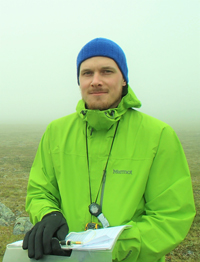 |
Olli Karjalainen - FinlandOlli Karjalainen is a postdoctoral researcher at the Geography Research Unit, University of Oulu (Oulu, Finland). In his doctoral thesis (published in March 2020) he studied the thermal and geomorphic sensitivities of circumpolar permafrost to 21st century climate change using statistical modelling methods. He also examined the hazards that degrading permafrost may have on the infrastructure across the Arctic. Other research interests include periglacial geomorphology in alpine environments. He has conducted field campaigns in Kilpisjärvi and Rásttigáissá regions in northern Fennoscandia. Member of PYRN since 2015. |
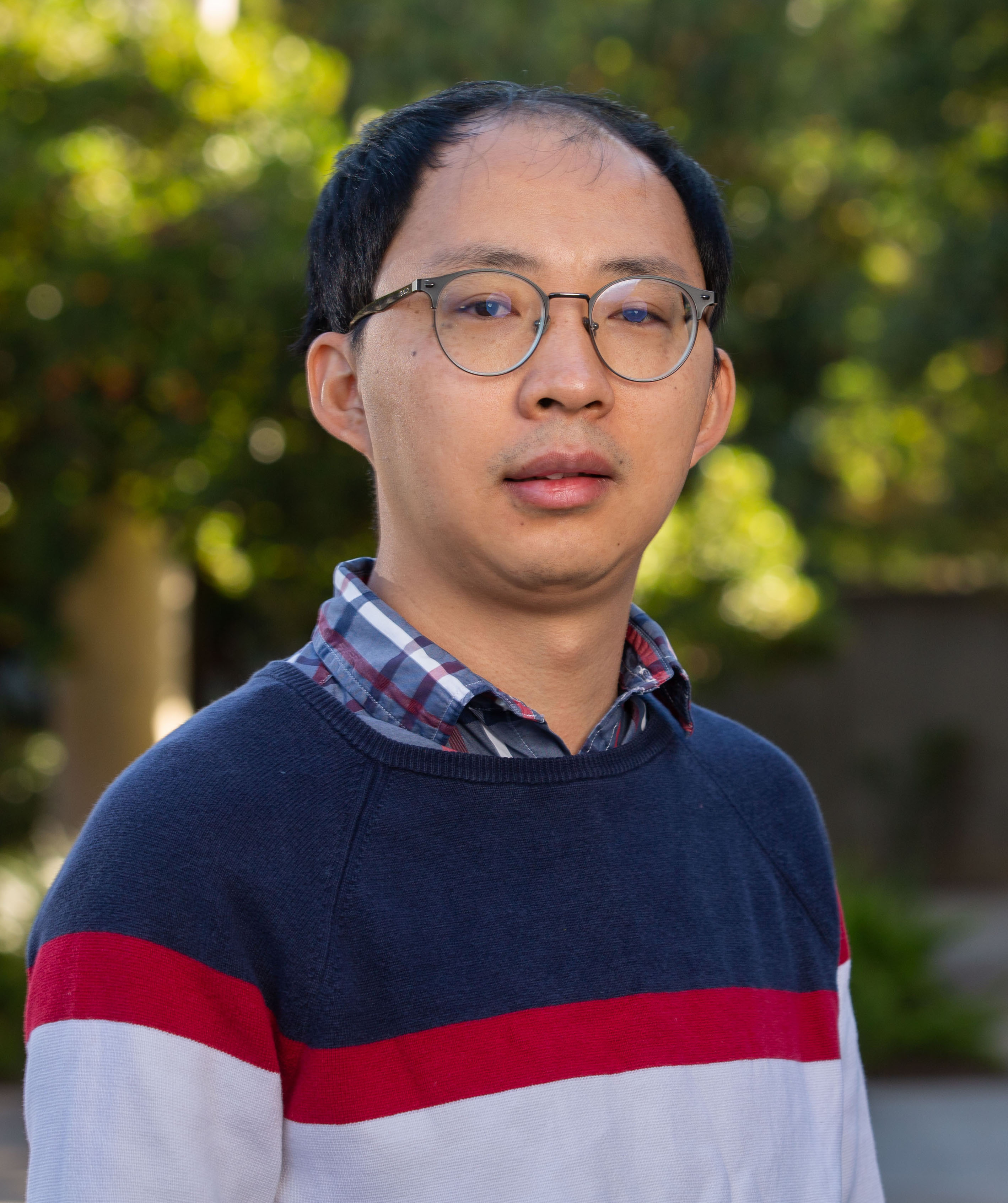 |
Lin Chen - USALin Chen is a postdoctoral researcher at the University of California, Riverside, USA. His postdoc project focuses on the development and implementation of computationally efficient methods for hydrologic modeling at the watershed scale. Lin completed his Ph.D. at the University of Montreal, Canada, where he utilized a combination of field observation and numerical modeling to quantify the surface energy components for different land cover types and to investigate the impacts of subsurface water flow on the thermal stability of roads and highways in high-altitude and high-latitude cold regions. Lin has rich field experiences in Qinghai-Tibet Plateau, China, Mohe city, the Northernmost city in China, and Yukon, Canada, where permafrost is an important factor controlling cryo-hydrogeological and biogeochemical processes. In these areas, the infrastructure experiences severe structural damage due to permafrost degradation. During his graduate study, geotechnical and geophysical investigations were conducted to characterize the ground stratigraphy and permafrost conditions. His current research interests include permafrost modeling, surface water-groundwater interactions, solute transport, surface energy balance, cold-region infrastructure, and computationally efficient algorithm. He is a board member of the PYRN Executive Committee and a PYRN national representative. |
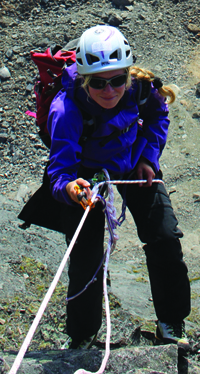 |
Florence Magnin - FranceFlorence Magnin is a postdoctoral fellow in the Universities Savoie Mont Blanc (France) and of Oslo (Norway). Her research interests focus on high mountain permafrost distribution and changes at various spatial and temporal scales, as well as on geomorphological processes related to permafrost dynamics. Her research aims at improving the understanding of morphodynamics such as rock wall destabilisation and related cascading effects in permafrost areas. She uses bedrock temperature measurements, modelling and geophysics. |
 |
Majbritt Westring Sørensen - GreenlandMajbritt Sørensen is the project manager for weather observations in conducted by Asiaq – Greenland Survey under the Greenlandic self-Government (http://www.asiaq.gl/). She has the responsibility for collecting climate data along the coast of Greenland for the benefit of the Greenlandic people. This includes soil temperature observations since the permafrost changes in Greenland are rapid and have huge implications for the infrastructural maintenance and planning and therefore it is an essential parameter to monitor continuously. The climate data collected by Asiaq are used in various research projects as well as being added to several databases, such as GEM (http://g-e-m.dk/) and GTN-P (http://gtnp.arcticportal.org/) databases. Due to their extensive experience in surveying and monitoring climate and hydrology in Arctic areas, they are an active partner in both research, infrastructural and logistical projects conducted in Greenland. |
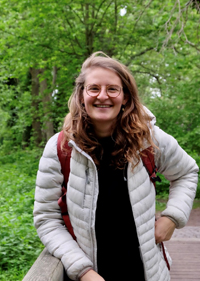 |
Charlotte Haugk – SwedenCharlotte is recently graduated Masters student at the University of Potsdam, Germany. When attending a permafrost course at UNiS in Svalbard her interest for permafrost science was initially sparked and she has been passionate about it ever since. She did her thesis at AWI on organic matter characteristics of permafrost and implications for the nearshore biogeochemistry at the land to ocean interface in the Lena Delta. After her masters she will continue investigating biogeochemical properties of permafrost with a PhD at Stockholm University about mercury release from thawing permafrost. Charlotte has been involved in several science communication projects such as co-organizing workshops series “Make permafrost great again” for high school students and co-managing the social media activity of the Nunataryuk project. |
 |
Sebastián Ruiz Pereira – ChileSebastián is a PhD Candidate at the Geography Institute, Pontifical Catholic University of Chile. Has worked in psychrophile adaptation and landscape evolution of periglacial and glacial environments in Southern Patagonia and Antarctic Peninsula. Current research topic is the role of frozen-grounds in the hydrological cycle at 33°S, Central Andes. Research interests are hydric resource legislation, landscape philosophy and hydrological interactions between glaciers and glacial forelands. |
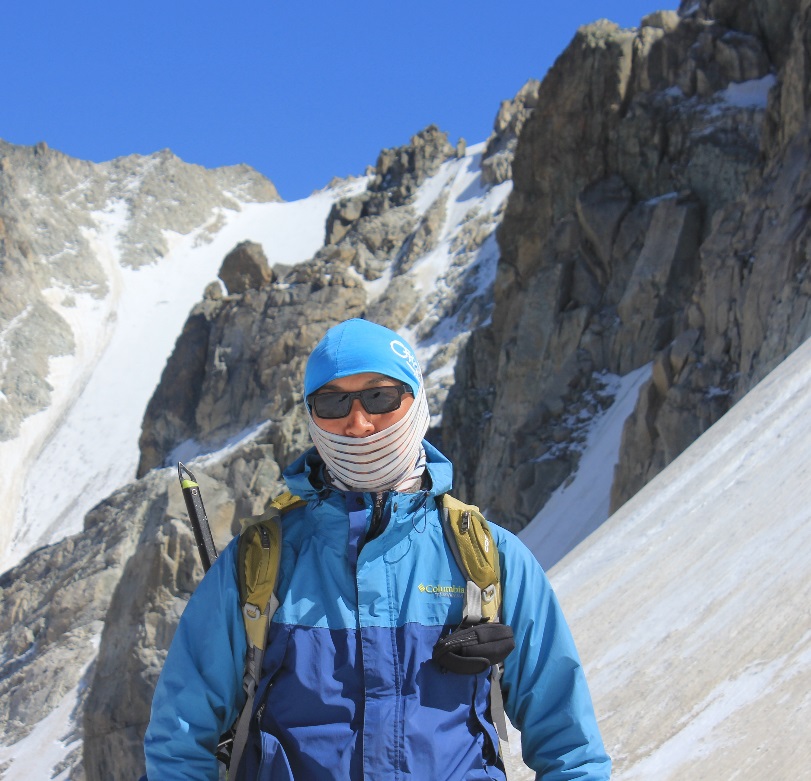 |
Avirmed Dashtseren – MongoliaAvirmed Dashtseren is working as a leading researcher and Head of the Permafrost Division in the Institute of Geography and Geoecology, Mongolian Academy of Sciences. In 2015, he graduated with PhD at Hokkaido University, Japan. His research is focused on the state of the margins of permafrost and glaciers in Mongolia in nexus with the interaction of climate change and ecosystem. |
 |
John Kingsley - NigeriaJohn Kingsley is a Geographic Information System and Digital Soil Mapping Expert and a prospective Doctoral college student at the University of Calabar, Calabar, Nigeria, West Africa. His Master of Science Degree Research focused on using digital soil mapping tools in land evaluation and soil characterization for proposed oil palm production at Ekpri Ibami in Akamkpa Local Government Area of Cross River State, Nigeria. His study further explains the classification of soils developed on basement complex parent materials using XRD diffractogram. He has submitted a PhD research proposal on the use of digital soil mapping technique in the evaluation and characterization of soils of permafrostic region of Nigeria on the production of some few selected cold-loving crops. Extensively, his project focuses on monitoring and management of environmental changes occurring within permafrost areas. |
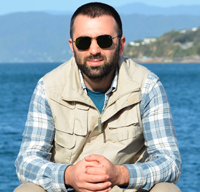 |
Levan Tielidze - GeorgiaLevan Tielidze is leading a group studying glacier variations in Georgia (Caucasus). He was a Research Scientist at the Institute of Geography, Tbilisi State University, in 2006-2018 and Senior Research Scientist in 2018-2020. Currently, he is a Ph.D. student at the Antarctic Research Centre and School of Geography, Environmental, and Earth Sciences, Victoria University of Wellington. The field of his research is modern glaciers and glacial-geomorphological studies of the mountainous areas in the Quaternary (Late Pleistocene and Holocene). He also studies the geography of mountain environments, permafrost, and karst processes. Please read more about his projects here: https://glaciologygeorgia.wordpress.com/ |
 |
Prashant Baral - NepalPrashant Baral is a Ph.D. candidate at NIIT University. For his Ph.D. research, he is working towards simulating permafrost conditions in the Himalayan region using remotely sensed data set and computational models. These models are built using machine learning techniques for the assessment of current state of permafrost distribution and predictions of the extent and impacts of future changes. He graduated with an M.Sc. by Research in Glaciology where he studied field based techniques for the glacier mass balance estimations of clean type and debris covered glaciers in a Himalayan catchment. He also had the opportunity to work with the analysis of meteorological variables in a mountain valley. During his research internship at ICIMOD in Nepal, he was one of the members of the research team for the pilot study towards assessing environmental and societal impacts of permafrost thaw in the Hindu Kush Himalayas. His main research interest is to work in the field of application of remote sensing methods and machine learning algorithms, for observation, prediction and forecasting of spatial and temporal attributes of cryospheric components and processes. |
 |
Zhenming Wu - UKZhenming is a PhD student at Department of Meteorology, University of Reading. His research is focusing on Arctic permafrost change monitoring with interferometric SAR and greenhouse gases emission modelling. He has got rich fieldwork experience in the Tibetan permafrost region from his master project at the University of Chinese Academy of Science which includes monthly soil sampling and surface elevation monitoring with levelling, as well as deep boreholes drilling for permafrost thermal condition monitoring. He is also planning more than three times fieldwork in Sweden permafrost area during a whole thawing period, in order to obtain key parameters related to greenhouse gases emission. |
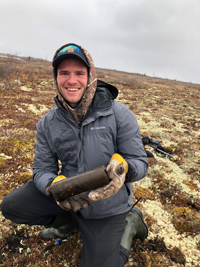 |
Adam Kirkwood - CanadaAdam is a first year PhD student at Laurentian University, Canada, in the Boreal Ecology program. His PhD research is focussed on the transition of permafrost zones from continuous to discontinuous in the Hudson Bay Lowlands, the world’s second largest northern peatland. His PhD research will also investigate the concentrations of mercury stored in permafrost, the potential for it to be methylated via soil microorganisms, and the transport of this mercury through degrading permafrost environments. His PhD research will include work with remote sensing techniques, geotechnical investigation, geomorphological evolution of permafrost features, and mercury biogeochemistry associated with thawing permafrost. Adam’s M.Sc. work focussed on the microbial mediation of greenhouse gases from thawing permafrost, and the role of permafrost thaw in influencing peat chemistry and microbial communities. Adam is passionate about northern research and enjoys field work and working with northern communities, as well as networking with fellow permafrost researchers. |
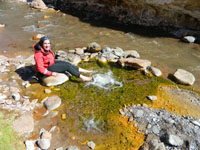 |
Carla Tapia - ArgentinaCarla Tapia is a PhD student in the Argentine Institute of Nivology, Glaciology and Environmental Research (Ianigla). Her PhD project focuses on the characterization of cryospheric systems and mountain permafrost determination in Central and Dry Andes of Argentina (http://www.mendoza-conicet.gob.ar/portal/ianigla/paginas/index/geocriologia). The research approach is at the regional scale using remote sensory data, permafrost indicator’s databases and long-term meteorological registers, geotechnical sampling and testing, combined with intense field work. Carla is also interested in periglacial geomorphology in mountain environments, mountain permafrost modelling, landslides and natural hazards related with permafrost destabilization. She is also working as a Secretary of Argentine and South-American Permafrost Association (AASP) and as a webmaster of AASP webpage.
|
 |
Dericks - IndiaCurrently working as Associate professor in the School of Civil and Environmental Engineering at the Indian Institute of Technology, Mandi, I Completed my Ph.D. in Remote Sensing and GIS from the University of Delhi in 2012. I am currently working on permafrost mapping, permafrost degradation, landslide susceptibility mapping, forest fires, vegetation studies and environment related problems of the Himalayan region that could be analysed with Remote Sensing. Many of these problems are related to climate change and global warming, so how can we use remote sensing to assess the susceptibility, risk and vulnerability of these issues are the main focus of my research group. Recently we did a field survey of rock glaciers and found significant locations where mountain permafrost is present in higher elevations of Himalayas. We have mapped those probable permafrost areas using Machine learning algorithms and in near future we want to calibrate these models with the field data.
|
 |
Shalaka Patil - NorwayShalaka Patil is a doctoral researcher affliliated to University of Bergen, working in collaboration with University Centre in Svalbard (UNIS) and University in Tromsø (UiT), Norway. Her research is about exploring microbiology and geochemistry of permafrost structures found in Svalbard region of Arctic. Part of her work is to standardize Arctic fieldwork strategies for future biologist for which she was awarded Arctic Fieldwork Grant 2021. She works on assessment of microbiome from Arctic permafrost using multi-omics for understanding greenhouse gases emissions and quantification of methane gas of biogenic origin. Until now she has four years of research experience of working with microbes from extreme environments. Shalaka also works for APECS International as National Committee Coordinator and involved in APECS Norway.
|
 |
Giulia - AustriaGiulia is a geologist by training and currently a PhD Candidate at the Institute for Interdisciplinary Mountain Research (IGF - Austrian Academy of Science) in Innsbruck. Giulia also works together with the Institute of Earth Sciences of the University of Graz. The current focus of her research are rock glaciers in the Austrian and Italian Alps. In particular, Giulia studies the hydrogeological properties and meaning of rock glaciers in high-alpine catchments. Alongside her PhD she supports glacier field campaigns of the IGF on several Austrian glaciers, including mass balance measurements, ice thickness measurements and ice coring.
|
Annette Carshalton - New ZealandAnnette is currently in the second year of her Masters at the University of Waikato, New Zealand. Her research is focusing on the changing soil climate and permafrost in the McMurdo Dry Valleys and the coastal areas near Scott Base, Antarctica. She is working with a 17-year long dataset, with data from nine sites, to look for short-term trends and patterns in the area. She is currently focusing on finding if there is a strong enough relationship between atmospheric conditions and the depth to permafrost, in the hope that she can build a spatially predictive model. |
|
Julie Wee - SwitzerlandJulie is PhD student at the University of Fribourg in Switzerland. She is a physical geographer with a research interest focusing on the understanding of processes in high mountain and periglacial environments. The types of geomorphological system that |
Former national representative
 |
Renato R. Colucci – ItalyRenato R. Colucci works in the climate and paleoclimate research group (http://www.ismar.cnr.it/research/climate-and-paleoclimate/research-group) of ISMAR at the Department of Earth System Sciences and Environmental Technology, italian CNR. His research is focused on glacial and periglacial geomorphology of high-altitude and high-latitude environments, both in the Alps (Eastern Alps, Dolomites, Stelvio, Austria, Slovenia, Switzerland) and outside Europe (Cordillera Andina – Chile, Karakorum-Pakistan, Antarctica), and their interactions with the climate system. After completed his PhD in Environmental Sciences in 2013, during which he also studied few months at UNIS (Svalbard), he is now involved in several projects aiming at understanding the impacts of climate change to such environments as well as to reconstruct the climate of the past by using geomorphological and geochronological proxies. Since 2016 he is leading the C3project (www.c3project.net) devoted to the study of ground ice in high altitude caves of the Alps. |
 |
Josefine Lenz - Germany (2016-2018)Josefine Lenz is a postdoctoral researcher at the Alfred Wegener Institute in Potsdam, Germany, and affiliated with the University of Alaska Fairbanks, USA. She works on thermokarst lake dynamics by using lake sediment cores as paleoenvironmental archives. The initiation, multiple phases and drainage of lakes, as well as the carbon dynamic and storage are of special interest for her. Since 2014, Josefine is German Representative within PYRN DACH (Germany, Austria and Switzerland) and stayed involves as Ex-Officio since her activity in the PYRN ExCom 2014-2016. She is an IASC Fellow 2015, APECS Vice-President 2016/2017 and co-founder of APECS Germany. |
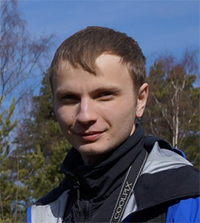 |
Alexey Maslakov - Russia (2018-2020)Alexey Maslakov is a PhD student at Lomonosov Moscow State University, Faculty of Geography. His fields of study are arctic coastal dynamics, seasonal freezing and thawing processes and permafrost changes due to climatic and anthropogenic factors. His study area is Eastern Chukotka, where he works since 2012. Alexey was involved in PYRN community in 2012 during Tenth International Conference on Permafrost (TICOP) and staying an active member. In 2014 he was elected as PYRN ExCom member and national correspondent for Russia. The second election will allow him to continue current activity and facilitate work of new ExCom members. Alexey is responsible for PYRN newsletter, promotion and outreach; he also takes part in organizing scientific and social events for young Russian permafrost researchers. |
 |
Matthew Whitely - USA (2018-2020)Matthew is a Master’s graduate from the University of Alaska Fairbanks. His uses the lens of remote sensing to study permafrost geomorphology and hydrology. His Master’s thesis focused on mapping sporadic permafrost on the Yukon Kuskokwim Delta of Alaska, but if you ask him, he’ll talk your ear off about aufeis. |
 |
Shridhar Jawak - IndiaShridhar Jawak is rearcher at National Centre for Antarctic and Ocean Research, Earth System Science Organization, Ministry of Earth Sciences, India. His research focuses on remote sensing of the cryosphere, especially studying glaciers, supraglacial environments, and cryospheric vegetation. He is currently working on Arctic glaciology project (http://www.researchinsvalbard.no/project/7349) which deals with the characterization of glacier surfaces using multispectral imagery analysis to infer climate change. |
 |
Ingo Hartmeyer - AustriaIngo Hartmeyer is a member of the scientific staff at the Georesearch Institute in Salzburg, Austria (http://www.georesearch.at/de/). His background is in high mountain geomorphology and he is currently finishing his PhD at the University of Salzburg. Ingo is co-responsible for running the "Open Air Lab Kitzsteinhorn", a long-term monitoring site for alpine permafrost in the Hohe Tauern Range (Austria) that comprises extensive borehole and gelectrical measurements. Based on terrestrial laserscanning surveys Ingo is investigating spatial patterns of rockfall and their relationship with glacier retreat, high mountain permafrost dynamics and frost weathering. |
 |
Samuel Weber - SwitzerlandSamuel Weber research interest concerns heterogeneous environments and climate change, especially process understanding and quantification of phenomena in mountain permafrost related to climate. His vision is to investigate fracture kinematics, to improve the understanding of processes in mountain permafrost using geophysical methods, to detect rupture processes in instable rock masses, assess rupture imminence and to design an early warning system for rock instabilities. For this, the combination of geo-science and engineering is very useful and enables field measurements at locations in hardly accessible environments. He greatly enjoy doing field work in alpine environments and being able to combine my knowledge as well as his experience with my alpine skills. |
 |
Li Han - ChinaLi is a PhD candidate in hydrology and climatology at the University of Heidelberg, Germany. Her research focuses on the permafrost hydrology and it’s response to changing climate in Siberia. Before that, Li first did her BSc in hydrology and water resources at Lanzhou University, China. Then she continued her MSc at Sichuan University, focusing on the spatial-temporal characteristics of hydrological processes and their response to climate change in the Yangtze River source region. |
 |
Elena Kuznetsova - NorwayElena Kuznetsova is working as a researcher at the Department of Civil and Environmental Engineering at Norwegian University of Science and Technology (NTNU) in Trondheim, Norway. She has a background in permafrost engineering from Lomonosov Moscow State University, Russia. Elena took her PhD in 2011, and since 2012, she has been living and working in Norway. Two years she was working as a research scientist in SINTEF, the largest independent research organization in Scandinavia, and since 2014 she has been working at NTNU. Her main research interest is transport infrastructure built in areas of deep seasonal frost and permafrost. Elena was involved in PYRN ExCom in 2014-2015 and now she serves as a PYRN National Representative. |
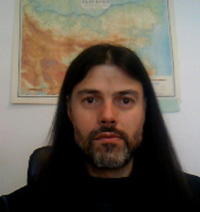 |
Emil Mariov Gachev - BulgariaEmil Mariov Gachev is an Associate Professor (PhD in Physical Geography) at the Department of Geography, Ecology and Environmental Protection, Faculty of Mathematics and Natural Sciences of the South-West University “Neofit Rilski” in Blagoevgrad, Bulgaria. |
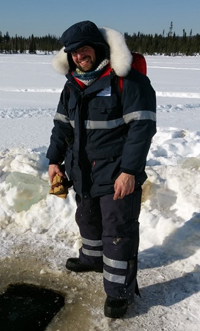 |
Matthias Winkel - GermanyMatthias is a former PostDoc of the section Geomicrobiology in the GFZ, German Research Centre for Geosciences and worked for four years in the Young Investigator Group under the supervision of Susanne Liebner. During his last year he got a subaward from the University of Fairbanks Alaska and joined a project lead by Katey Walter Anthony, Anna Liljedahl, Ronald D. Daanen, Vladimir Romanovsky and David Barnes. He worked/ still working on deep permafrost thaw environments such as submarine permafrost, thermokarst lakes and try to understand the organic matter degradation and greenhouse gas production as well as the mitigation of the gases (anaerobic oxidation of methane). Since these environments are chronosequences that thaw over long timescales these are perfect examples of how the microbial community will evolve in a globally changing climate. He is also working on active layer microbial communities in permafrost-affected peatlands and the influence of hydrology due to climate warming. He mainly uses molecular tools to characterize the microorganisms, analyze the biogeochemical background, use stable isotopes to understand specific processes and made my first steps into modelling. Now he moved to the section Interface Geochemistry and will mainly be working on snow and ice algae. He will try to understand the adaptation in these harsh ecosystems and will focus on the genomic repertoire of the algae. |
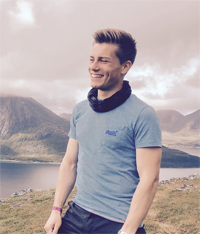 |
Jannik Martens – SwedenJannik started his PhD studies in Applied Environmental Science at Stockholm University in 2017. His research project investigates historical and geospatial variability of permafrost carbon that was remobilized and transported to Arctic Ocean shelf sediments. This is studied using molecular and isotopic analysis of sediment cores and surface sediments from the Arctic Ocean. With his research he contributes to a better knowledge about carbon cycling in the Arctic which is of relevance for permafrost carbon – climate feedback processes. By attending the International Conference on Permafrost in 2016, Jannik came in contact with other PYRN Members and recognised his motivation to participate in international teamwork for the next years. |
